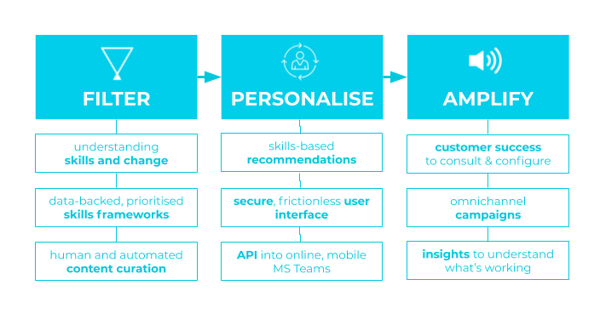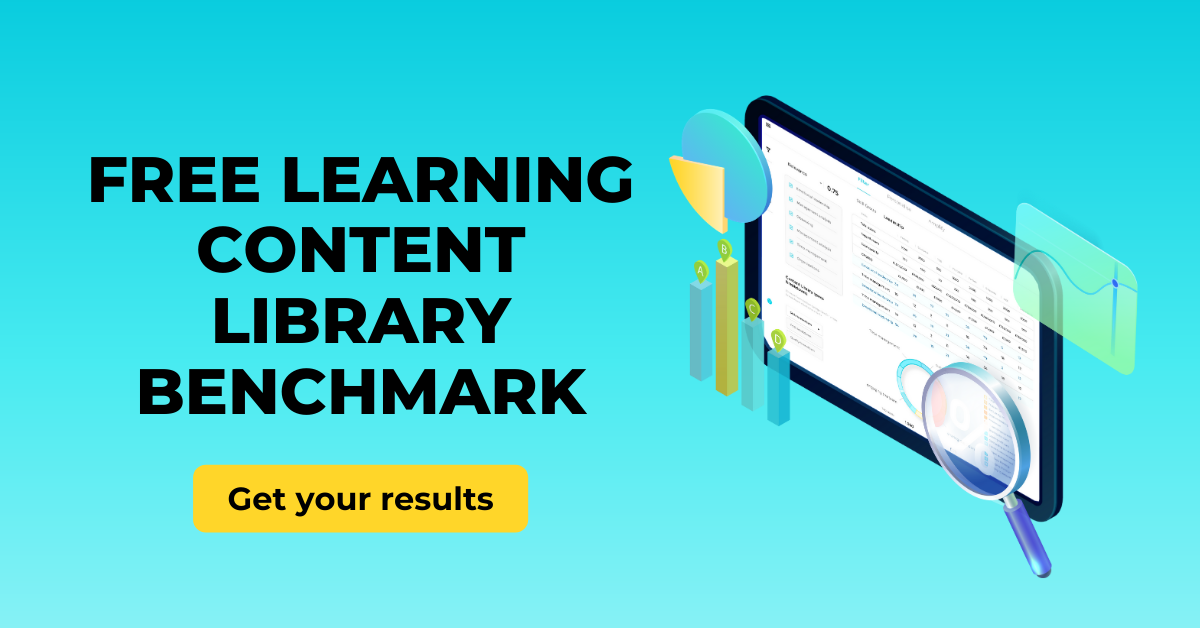TL;DR: Filtered brought the world a new feature – intelligent learning recommendations – but we do so much more. Here, we finally embrace the LXP moniker. But also explain why LXPs have a long way to go to become smart, and what yours must be able to do to qualify.
We’ve got to own up
Our intelligent learning recommendations are at the forefront of all the work we’re doing to help clients build a skilful, productive, learning workforce. But they’re not the only thing we do. As Josh Bersin correctly identified in March 2019, Filtered is an LXP. So why didn’t we just say so?
Well, no one wanted to be called an LXP at the time. The ‘successor to the LMS’ had seemed to fall at the first hurdle, becoming a learning landfill and making content overload worse. The promised tagging, recommendations, data and content intelligence (that we successfully delivered in the meantime) failed to materialise.
But the LXP category has started to mature and proven it can stand on its own two feet – for now at least. The market continues to evolve and demand more features to address content overload: features like search and structured pathways. So we are responding in kind.
We’ve built those features into our own Filtered platform. One filled with every ounce of our content intelligence and powered by the magpie engine. One that will solve the content overload problem, not add to it. A smart LXP.
And though it’s all a race, we think of it more as a race to the moon than an arms race. We all have the same goal: making learning better. And if we can just help the industry take one small step towards that goal, we’ll be happy.
We’ll do it in our own way of course (taking a less is more approach, filtering and curating and applying content intelligence), and we understand that’s not the only way. But if you’re a smart, radical, transformative learning leader you’ll want in on our mission.
-1-min.png?width=344&name=Filtered%20(LXP)-1-min.png)
But what is an LXP?
The LXP can be thought of as a learning platform focused on engaging end users vs. the LMS, which is focused on managing learning for instructors and administrators. Better end user engagement entails an almost limitless array of potential features: super-search, making curation and authoring possible for anyone, workflow integrations, recommendations. The LXP is such a big product that it often isn't funded by the expectation of financial ROI per se, but by the goal of modernising L&D, democratising learning culture and driving innovation, all significant goals for companies of all sizes.
Josh Bersin successfully defined the LXP category after several false dawns and acronyms that didn’t catch on (Toby’s own ‘Learning Experience Network’ or LEN, the ‘Learning Engagement Platform’ or LEP and Fuse and Fosway’s ‘Next Generation Learning Environment’ or NGLE). Not long after, Bersin came to criticise his category as having become a ‘flea market for learning’ and has sought to win traction for the ‘integrated learning platform’ and then the ‘capability academy’. But the LXP category stuck (whether you like it or not) and (whether we like it or not) Filtered has always been part of these conversations.
Bersin’s own summation of where the LXP has to go to survive in April 2020 is a really good reference point for what we think about the category:
“The LXP market, which I’ve written about extensively, is a fast-growing space. These systems were designed to solve the problem of “easy to use discovery platforms” for corporate learning. Think YouTube, Netflix, Spotify of learning (all these phrases have been used).
But over time they became “websites of content,” so the LXP vendors are swimming upstream. They’re building learning paths, recommendation engines, video indexing and all sorts of new features. Guess what: Microsoft Teams can do this too!
The real problem in corporate learning is not “intelligent search” like YouTube, but rather building a context and directed experience that helps people solve problems. So the “recommendation engine” is quite complex, and it is far different from the “click-bait” type of rules we experience on YouTube or Facebook.
This entire space is yet to shake out.”
The LXP needs to smarten up
We agree with Josh that the LXP category has “yet to shake out”. In fact, there’s still every chance it could disappear altogether if it cannot address some serious shortcomings. If it continues to follow the trend of existing LXPs to be no more than an aggregator with a slick interface, a new repository for old content, the LXP is simply not worth the vast expense it entails.
And whilst there is genuine value in the way that LXPs enable faster curation and content development (for example, through pathways), who is quality-controlling all this content, and pathways, and to what end? Learning a new skill never looks like a pathway that can be visualized on a system, it’s a messy and wonderful encounter with reality.
At the same time, this truth about learning doesn’t mean that organisations should throw their hands up and let nature take its course. Nature can be deeply unfair. Refusing to implement integrated learning ecosystems limits exceptional learning experiences to well-networked individuals and assures a diet of transactional, generic and compliance-driven online learning for most workers.
In other words, despite the fact that the human brain is evolved to pursue goals and learn things with or without intervention, we need LXPs and large centralised learning systems for the same reason countries need governments with strategic plans. We plan learning to support business imperatives like profitability, growth or transition into digital business models, and because a rising tide lifts all ships.
Learning needs a filter
But work (and life) is noisy, confusing and chaotic. It is very difficult even to know what your target capabilities should be without boiling the ocean of possible futures. And even once you know what people should be focusing on, it’s even harder to get their attention.
We’ve learned how susceptible we are to the persuasive technologies criticised in The Social Dilemma that take our eyes off what is important and focus our attention on junk written for clicks. That sea of distracting junk rises around us before we even notice and faster than we can bail. And now our learning systems are filling up too.
And so we need a filter to keep the good and pump out the bad, and a way to get it to the right people at the right time. That’s all your LXP really needs (simple right). Here’s how Filtered does it:

Filtered LXP is just that: the only enterprise learning system that is able to help you understand what really matters, analyse all of your content on that basis, and as a result, actually enable the kind of open, fair access to transformative experiences we all want to provide. And we are serious when we say that there is no future for this category if it isn’t intelligently filtered, if it doesn’t deliver the smartness it promised at the outset.
And yes, there will be more of the features you have been asking for.

